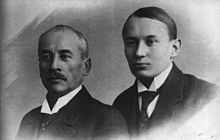Aarre Merikanto
Aarre Merikanto (born June 29, 1893 in Helsinki , † September 28, 1958 there ) was a Finnish composer .
Life
Aarre Merikanto was the son of Liisa Häyrynen and Oskar Merikanto (1868–1924), one of the most famous Finnish composers of his time. He spent his childhood in Vilppula , Finland , received musical training from his father at an early age and wrote his first compositions as a teenager. Merikanto studied music first with Erkki Melartin in Helsinki (1911) and from 1912 to 1914 at the Leipzig Conservatory with Max Reger . Reger jokingly called him Master Quinte (because of his insistence on parallel fifths ), but thought highly of him and in 1914 supported the award of one of the two Conservatory Prizes for Composition to his student. In November 1914 Merikanto gave a concert with his own works in Helsinki. In the winter of 1915/1916 he studied for 4 months in Moscow with Sergei Wassilenko . In 1919 he married Meri Grönmark. In 1937 Merikanto became a teacher of theory and composition at the Sibelius Academy in Helsinki. In 1951 he received a professorship for composition there.
Merikanto's students include: a. Jaakko Linjama , Usko Meriläinen , Ilkka Kuusisto , Einojuhani Rautavaara , Aulis Sallinen and Paavo Heininen .
style
Merikanto's works developed from the initial reception of Reger's personal style through the early national romantic orientation based on local folklore and after a radical change of direction went to the expressive-modern opera Juha (1920-22) and the so-called Schott concert of 1924. On Sinfoninen Harjoitelma ( Symphonic Study, 1928), after 1933, there was a renewed aesthetic change to simpler, neoclassical music for everyday use, such as his Olympic fanfare of 1952.
His radical style, developed in the 1920s, combines expressionist traits with a highly colorful instrumentation (in some cases with echoes of Alexander Scriabin or Karol Szymanowski ). In his home country he encountered a lot of incomprehension during his lifetime. The opera Juha from 1922, now considered a milestone in Finnish opera history , was rejected by the Finnish National Opera and was first performed in 1958, after the composer's death. Many works were premiered posthumously.
Selection of works
- Oper Juha based on the novel by Juhani Aho (1922; on December 3, 1958, after Merikanto's death, premiered in concert; staged world premiere in 1963 Oper Lahti)
- 3 symphonies (1914/16, 1918, 1952/53)
- 4 violin concertos (1915, 1925, 1931 (destroyed), 1954)
- 3 piano concertos (1913, 1935–37, 1955)
- 2 cello concertos (1919, 1941/44)
- Schott Concerto for violin, clarinet, horn and string sextet (1925)
- Symphonic poems, etc. a .:
- Lemminkäinen (1916)
- Echo for soprano and orchestra (1922)
- Pan (1924)
- Notturno (1928)
- Kyllikkis Abduction (1936) (fin .: Kyllikin ryöstö )
- Chamber music, etc. a .:
- Concert piece for cello and chamber orchestra (1923)
- Concerto for violin, clarinet, horn and string sextet (1925)
- Nonet for flute, English horn, clarinet, piano and string quintet (1926)
Merikanto also wrote (1939) the fanfare for the 1952 Olympic Games in Helsinki (planned for 1940).
literature
- Osmo Tapio Räihälä: Merikanto, Aarre. In: Grove Music Online (English; subscription required).
- CD supplement Finlandia 4509-99970-2 (Merikanto: Ten Pieces, Fantasy f. Orch., Violin concertos 2 + 4 etc.), text by Kimma Korhonen (1996)
- Klassika catalog raisonné Aarre Merikanto prepared by Johannes Hanstein (German)
Web links
- Works by and about Aarre Merikanto in the catalog of the German National Library
- Information ( memento of April 16, 2014 in the Internet Archive ) at Music Finland (English)
- Catalog of works at klassika.info
- Opera "Juha", Interlude, Savonlinna Opera Festival 2002
Individual evidence
- ↑ Seppo Heikinheimo: aarre merikanto: Säveltäjänkohtalo itsenäisessä Suomessa , p 537. Helsinki 1985. ISBN 951-0-13319-1
- ↑ Aarre Merikanto's Juha: The cornerstone of Finnish modern opera (Engl.) ( Memento from October 8, 2014 in the Internet Archive )
- ^ Concerto "Schott", description
- ↑ Work data on Juha based on the MGG with discography in Operone
| personal data | |
|---|---|
| SURNAME | Merikanto, Aarre |
| BRIEF DESCRIPTION | Finnish composer |
| DATE OF BIRTH | June 29, 1893 |
| PLACE OF BIRTH | Helsinki |
| DATE OF DEATH | September 28, 1958 |
| Place of death | Helsinki |

